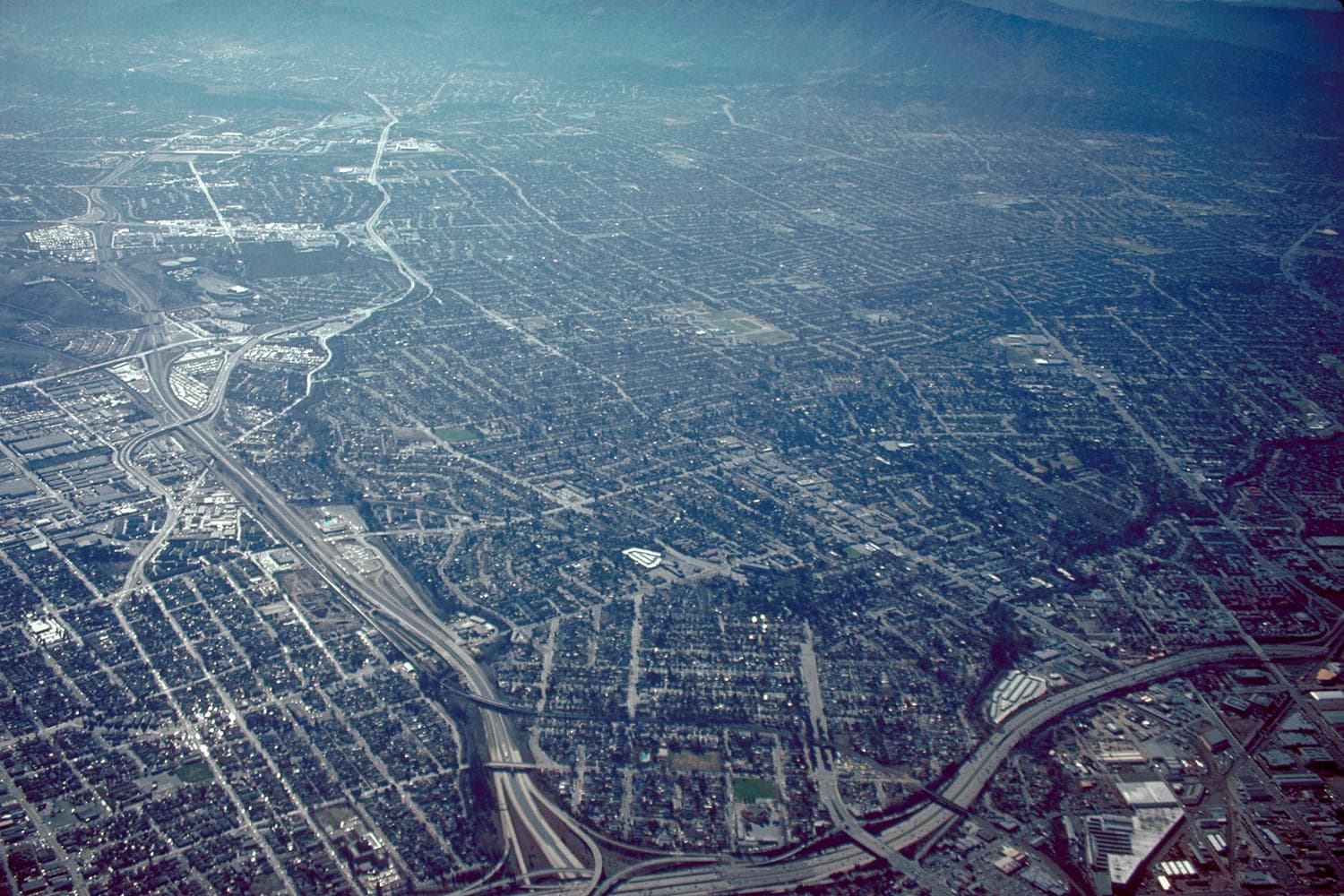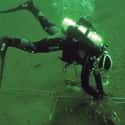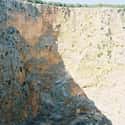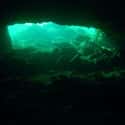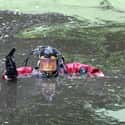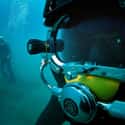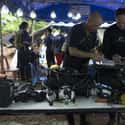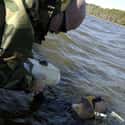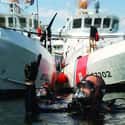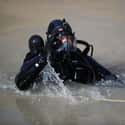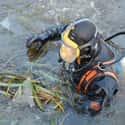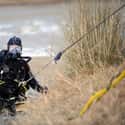-
(#1) Environmental Hazards And Equipment Malfunctions Make The Job Dangerous
Although lakes and slow-moving rivers may seem like relatively safe places to dive, rescue and recovery divers still face many dangers on the job. Masks can be accidentally pulled off in frigid water, equipment can malfunction, frantic divers can grab respirators, and unseen obstacles, such as concrete, rebar, and submerged trees, all pose a serious threat to the safety of recovery divers.
The danger that comes along with the job, however, can also bring dive teams closer together. In a 2016 video, the Texas Parks and Wildlife dive team stated they would do anything for each other, and they always have each other's backs both in the water and on land.
-
(#2) Recovery Efforts Can Sometimes End In Tragedy
In 1994, a 20-year-old South African diver named Deon Dreyer lost his life while diving Bushman's Hole - the third-deepest freshwater cave that has been discovered. About 10 years later, expert cave diver Dave Shaw discovered Dreyer's body 270 meters deep while exploring the same cave. Shaw decided to bring Dreyer back to his parents and began a recovery effort that required a large team of divers.
Shaw did not survive his mission. He succumbed to a condition called nitrogen narcosis, and the other divers on the team were unable to rescue him. Before he passed, however, Shaw managed to tie Dreyer's body to his own, and a few days later, the pair floated up to a retrievable depth. Dreyer's remains were ultimately returned to his family.
-
(#3) Occasionally, Luck Comes Into Play While Diving
The majority of missing cave divers don't make it back to the surface alive. But there have been a handful of cases in recent years where the skills of rescue and recovery divers, paired with advances in diving technology, have saved lives.
In a story shared with The Guardian in 2018, Florida dive instructor Edd Sorenson spoke about how he managed to save a teenage girl who had gone cave diving with her brother and father. Her father didn't realize the kicking motions used in open water cause clouds of vision-reducing silt in caves. The family quickly became overwhelmed, and the father and son retreated to open water and called in a rescue team for the daughter, who remained trapped in the cave. Sorenson recalled:
Inside, I began a zigzag search pattern; after about 10 minutes, I ran into her legs. She was treading water inside a dome with an air pocket created from divers’ bubbles. She had tried to get out a couple of times, but nearly got snagged on jagged rocks and turned back. She was lucky to have found the dome once, let alone twice. She was very cold, scared, and crying.
Sorenson led her to safety at the mouth of the cave, where she was reunited with her family.
-
(#4) Divers Bring Up More Than Human Remains
A big part of a rescue and recovery diver's job might be saving people in the water or bringing remains to the surface, but there is usually a lot more to the gig. Divers also search the bottom of rivers and bodies of water for items tied to police investigations and vehicles that have gone into the water.
Irish police diver Tosh Lavery worked the site where the Irish Republican Army claimed the lives of Lord Mountbatten and several members of his family in 1979. During the recovery mission, their remains and parts of the boat they had been on were carefully brought to the surface.
-
(#5) Many Divers Learn To 'Switch Off' Emotionally
Many rescue and recovery divers report being able to emotionally check out during missions - especially those that would otherwise take a toll on their psychological health. Recovery divers are often the ones tasked with bringing remains back to families, and the search for them can be distressing.
Many who make a career out of recovery diving are successful because of their ability to handle difficult cases. Although veteran police diver Tosh Lavery acknowledged he was not the norm, he once claimed, "I can say, hand on heart, that it never affected me. It was just the job."
Florida rescue and recovery diver Edd Sorenson seconds that sentiment, describing a moment in his career where he had to handle an unthinkable task:
In April 2012, I spent seven hours removing a young man’s body from a cave in Tallahassee, FL. He had taken off his gear to get through a small hole and become stuck. I had to manipulate his arms and legs so I could push him back through the hole because rigor mortis had set in. People ask me how I cope with something like that. I know it sounds cold, but I can switch off. I focus on the job.
-
(#6) Cave Dives Are Rarely Rescue Missions
Caves propose many unique challenges for rescue and recovery divers and are some of the most hazardous diving environments. Floods and tight spaces can make cave systems extremely difficult to navigate, even for the most experienced divers; therefore, there are many more recoveries in caves than rescues.
Rescues are still possible in cave systems though. One successful effort was the rescue of 12 boys and their soccer coach in Thailand in June 2018. Part of the large international team that rescued the boys had just survived their own harrowing cave diving experience in Mexico, where they were stranded for roughly three days without food or adequate supplies after a flash flood.
-
(#7) Many Divers Appreciate Being Able To Bring Families The Remains Of Their Loved Ones
American recovery diver Jamie Florek once said:
The outcomes involved with the dive team tend not to be good for the [people lost] or families. But whether we find someone or not, I think it’s nice to know. I would want to know.
That sentiment has been echoed by many other rescue and recovery divers around the world; they may face grim tasks in their daily work, but many do see the silver lining. They take pride in being able to give families a sense of closure. Divers are able to see the effect on the loved ones of those lost firsthand, and how much it matters to have remains returned. As Irish police diver Tosh Lavery put it:
I loved my job, I loved the machismo of it, but mostly I loved being able to present a grieving family with a [person] to bury... That was what mattered to me most.
-
(#8) Technology Helps In Near-Zero Visibility Conditions
Unlike recreational diving, where the primary goal is usually to enjoy the sights of fish and coral reefs, recovery diving is generally done in conditions where divers can barely see what's in front of their faces. Visibility in lakes and rivers is typically poor, with low light and heavy sediment. It's known as zero-visibility, or "black water."
Divers also have the additional challenge of looking for remains or discarded items in thick underwater foliage as they comb the lake or river bed. Luckily, advances in technology have made their job slightly more manageable. Recovery divers in Texas use underwater sonar imaging to assist with searches, cutting the dive time significantly.
-
(#9) Divers Come From Many Different Fields Of Law Enforcement
Depending on where they are, most rescue and recovery divers serve in different branches of the government or law enforcement. The Irish police force, the Garda Síochána, has a sub-aqua unit. The Stockton County Fire Department in California has a dive team led by their fire captain. The Texas Parks and Wildlife Department also has its own dive team.
Many dive team members across the board come to the job as police officers, firefighters, and game wardens without previous dive experience. They are all rigorously trained in the specialized skill of recovery diving, and many go on to serve their departments for decades.
-
(#10) You Don't Need Previous Aquatic Experience To Become A Diver
Irish dive veteran Tosh Lavery worked as a recovery diver for 30 years, as one of the original recruits for the Garda Síochána (Irish police) dive unit. In a 2015 interview, he explained that although many people assume divers need to be skilled swimmers or have prior diving experience, this isn't always the case:
[Rescue diving] is like nothing else in the world. It’s done almost always in nil visibility, feeling your way around. You don’t need to be an incredible swimmer, it’s not done at speed, but you need to know what you’re getting into and you need to be able to get into the water no matter what.
According to Lavery, an essential part of the job is the ability to work through the possible psychological distress caused by recovering remains. He notes that it isn't for everyone, even those who might be highly skilled divers.
-
(#11) There Are Major Differences Between Rescue Diving And Recreational Diving
According to Sean Hidalgo, a rescue and recovery diver with the Stockton City Fire Department in California, there are significant differences between diving on the job and diving for fun. Recreational divers rarely use full face masks, but they're often a necessary piece of equipment for recovery divers. This is especially true for Hidalgo, who frequently works in areas that have been affected by some level of contamination.
When asked about his preferences for diving in his spare time, Hidalgo said he likes to keep things light: "When I dive in Hawaii, I have a BC, tanks, mask, and a snorkel; I try and keep it simple and streamlined."
-
(#12) The Equipment Used By Recovery Divers Has Come A Long Way
When Irish police office Tosh Lavery first started working as a recovery diver in 1974, equipment included a substandard wetsuit, no light, and a rope to help divers find their way back to land. In the United States in the late 1980s, divers used a rope to communicate with the surface via a series of tugs.
Over time, there have been many improvements to the tools divers are given. Depending on the location, divers use higher-quality suits, full face masks, and in some cases, hazmat-certified dive suits to protect them from the elements.
New Random Displays Display All By Ranking
About This Tool
We have watched many thrilling sea rescue scenes in movies, some people even dream to be rescue and recovery divers. But the fact is that the rescues under the sea are never pleasuring and relaxing, and even bloody and risky. Becoming a professional rescue and recovery diver is never easy, which is not a simple rescue course to qualify for. A excellent rescue and recovery diver should have not only the most professional rescue knowledge but also abilities to withstand pressure and handle economic situations.
The random tool described 12 details about the world of rescue and recovery divers, who have to experience real terrors and dangerous moments at work, these things may change your view of this job.
Our data comes from Ranker, If you want to participate in the ranking of items displayed on this page, please click here.




